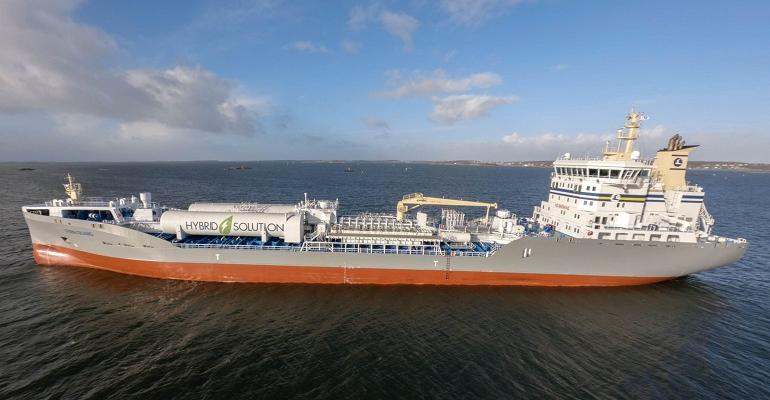Swedish tanker owner, Terntank, and the Port of Gothenburg have jointly pioneered the introduction of zero-emission port calls for tankers.
The Donsö Island based tanker company has installed the company’s own Hybrid Solution on board its latest new chemical and products tanker, the 15,000dwt Tern Island, built at China Merchants Jinling Shipyard, and delivered in December. The tanker made her maiden call at the Port of Gothenburg last Friday.
The Tern Island, designed by Terntank and Kongsberg Maritime, has an electric power supply system incorporating a battery pack, an onshore power supply connection and a DC Link which can eliminate auxiliary energy consumption almost entirely. The shore power connection has been developed in collaboration with the Swedish port.
The Tern Island has a range of other sustainable features. The dual-fuel main engine, boiler and auxiliary engine are designed to operation on biofuel. An optimised hull and rudder design, combined with the use of 30% biogas, will enable the tanker to cut carbon dioxide emissions by 70% and other harmful emissions by 97-99%, the company said, compared with a conventional vessel of similar size.
As well as fossil-free port operations, Terntank’s Hybrid Solution enables peak-shaving to reduce emissions further. Batteries also provide an energy reserve for power generation, limiting the unnecessary parallel operation of generators.
The tanker, with a capacity of 16,500 cubic metres in 14 epoxy-coated tanks, will work in the Baltic Sea area in a pool together with other Terntank vessels. She will be operated by the Finnish North European Oil Trade (NEOT).
Gothenburg’s shore power setup is part of the port’s initiative to cut annual carbon emissions from ships by 1,800 tonnes.
The move comes as a wide range of other ports adopt similar plans to provide power from shore for visiting ships. Introduced first in the cruise and ferry sectors, shore power is now finding its way into commercial port operations more generally and is being adopted by proactive ro-ro, ro-pax and car carrier operators, amongst others.
Source: Seatrade Maritime News






